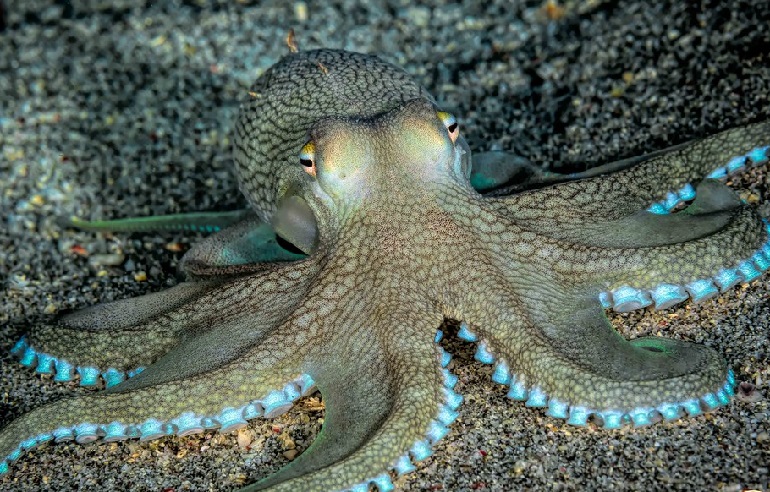Yes, octopuses have a mouth. But they are not the same as humans. The beak-like mouth is located underneath the octopus body surrounded by head appendages. It helps them to survive.
Do octopuses have mouths, where is it located, and how do they function? If you want to know the details of these exciting facts, keep reading this article. I will clear all your doubts and answer FAQ’s on octopus mouth.
Where Do Octopuses Have Mouths?
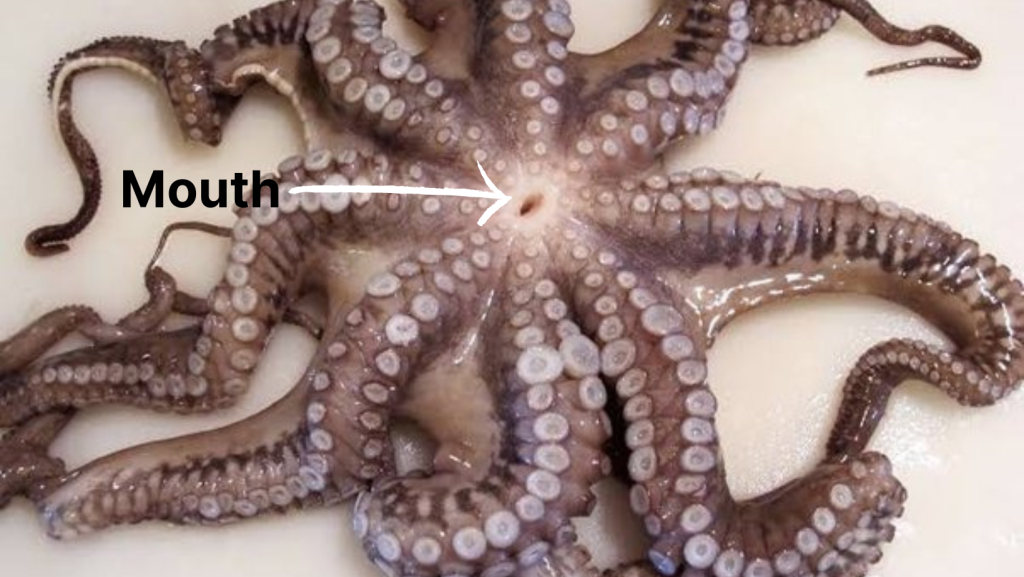
The mouth of an octopus is not often visible when it is swimming. It is located on the ventral side, where all eight arms of the octopus meet. The position of their mouth helps transportation and manipulation of food.
Octopus Mouth Segmentation
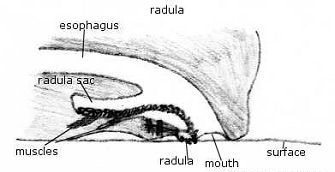
Octopus mount consists of several parts. Let’s see what they are and how they work.
Beak
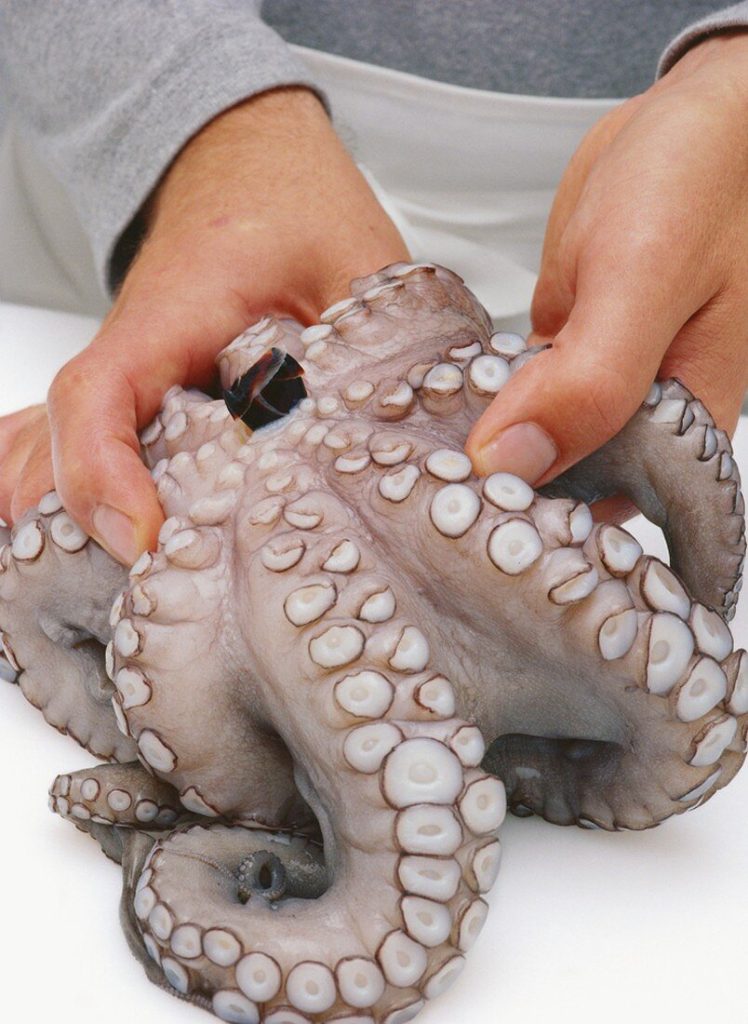
It is the most prominent part of the mouth of an octopus. As flesh eaters, octopuses need to cut their prey into small pieces. Sharp and robust beaks help them to do so.
The beak is made of keratin. It consists of two parts-the upper beak and the lower beak. A shoulder and bridge connect two parts of the beak. The upper beak length is normally 2-13mm and the lower beak is 1.5-10 mm.
Radula
The radula of an octopus works like a tongue. It has a ribbon-like structure covered with sharp rows of teeth. These teeth are known as ribbon teeth. They are made of chitin.
Chitin teeth’ number, shape, and size can vary depending on the species. There are normally 2-5 thousand teeth in the radula.
Radula and radula teeth help the octopus to tear apart the flesh from the victim’s body shell. It produces saliva to break its food into the smallest pieces.
Buccal Mass
The buccal mass refers to the muscular region surrounding the beak. It comprises various structures responsible for manipulating and processing food.
The muscles in the buccal mass assist in the movement of the beak. Buccal mass also aids in the ingestion and digestion of prey.
Salivary Glands
Octopuses have salivary glands located near their mouths. These glands secrete saliva to aid in the lubrication of food and the initial breakdown of carbohydrates. Saliva contains enzymes that begin the process of digestion.
The beak and radula of an octopus are used to dismember its victim. Enzymes found in saliva, such as lipases and proteases, help in digestion by breaking down fats and proteins.
Inc Sac
The inc sac is located inside the octopus’s mouth near the digestive system. It is an inbuilt defense in their body. If an octopus encounters a predator, it releases inc to block the hunter’s view.
It gives the octopus some time to flee. However, inc sacs have other purposes. They release inc to communicate or mating. It’s fascinating, right?
Significance of Octopus Mouth
Octopus mouths have many benefits. Here are a few of them.
Survival
The octopus mouth’s unique anatomy helps them adapt to diverse conditions. Octopuses meet different types of prey with numerous differences.
Their mouth helps them to break free from the defense of their prey. They can easily break shells and spines with their knife-like beaks. It helps them to have food and survive.
Hunting
Octopuses are masters at hunting. They catch their prey with their arms. But to kill them, octopuses use their mighty beak.
They bite the food with full force, and their beak tears apart the flesh of their prey. The mouth has a great purpose to serve in hunting.
Eating
The mouth is responsible for eating, digesting, and nutrition supplies. The beak and radula help octopuses to eat. To digest those foods, they produce saliva.
This process helps them to produce strength and provide the nutrition they need. Without the mouth, it’s impossible for them to survive in diverse marine conditions.
Studies
Scientists are continuously studying octopuses. The mouth gives a clear idea of their feeding and hunting strategies. Observing their tool use or camouflage techniques during hunting reveals the complexity of their cognitive and adaptive capabilities.
Can Octopuses Bite Humans?
Well, it’s possible. The sharp and strong parrot-like beaks can go through human flesh easily. It can cause tremendous pain and damage.
But luckily, octopuses fear humans. They avoid any type of conflict. However, they can be aggressive if they feel endangered. Try to avoid conflict and take precautions if you are likely to approach any octopus underwater.
How Toxic is the Octopus Ink?
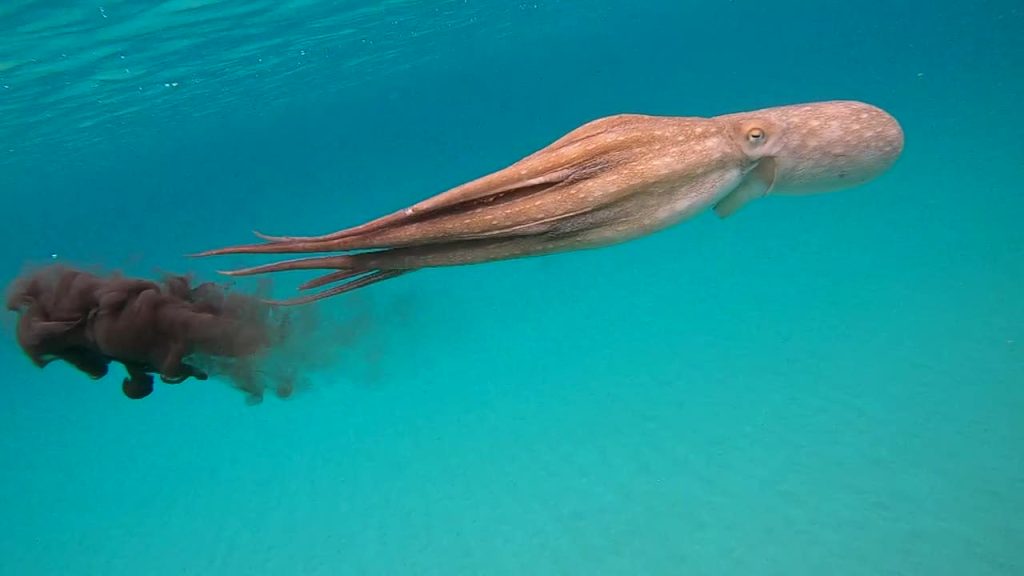
Octopus inks consist of melanin, mucus, or proteins. The melanin gives the ink a solid black color. This ink can kill small sea animals and even octopuses.
But there is no proof of octopus ink harming humans. There may be differences in the ink composition, yet humans are safe.
Conclusion
Some so many fascinating facts and rumors converged on the octopus. Octopus mouths are certainly something to talk about. You don’t see their mouth every day, and they are not usually shaped. I have discussed how they use their mouth, the structure of their mouth, and their importance of it.
This article should clear your doubts about octopus mouths. Stick with me to explore more fun facts about octopuses!
FAQ
How big is an octopus’s mouth?
The size of an octopus’s mouth mainly depends on the species. But one thing is common about octopus mouths. Their mouths are exceptionally small relative to their body.
Can octopuses bite?
Octopuses can bite but are not typically a threat to humans. Their bites are usually reserved for capturing and consuming their prey. It’s important to handle or interact with octopuses carefully to avoid any potential harm.
Can an octopus swallow prey larger than its mouth?
No, octopuses cannot swallow prey larger than the size of their beak. Before consuming them, they have to break down larger prey into smaller pieces using their beak and radula.

